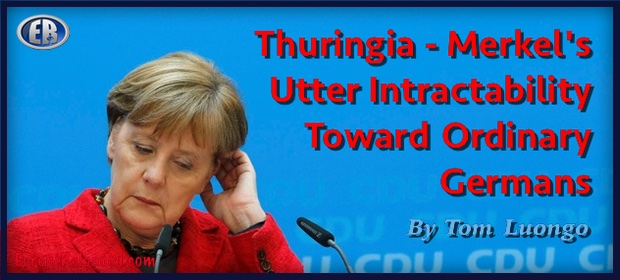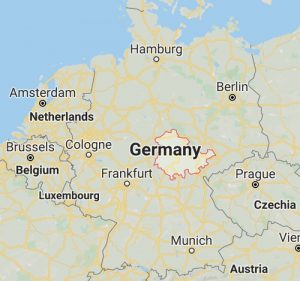
Pam Barker | Director of TLB Europe Reloaded Project
 the CDU (Merkel’s) and SPD. It was historic: The parties standing for globalism, mass migration, neoliberalism and ‘more EU’ got trounced. A coalition had to be formed out of so many different parties, yet nobody wanted to work with the ‘fascist’ AfD, the party that actually came in SECOND, behind Die Linke. A governing coalition got formed just 3 weeks ago, of Die Linke, SDP and the Greens. But several rounds of voting to produce a leader of the new government ended with one Thomas Kemmerich getting elected from a minority party, ousting the Left’s Bodo Ramelow in the 3rd round of voting. Problem: Kemmerich was able to pip Ramelow at the post because of vital support from the dreaded AfD. (Some of those votes supporting Kemmerich came from Merkel’s own CDU, hence CDU and AfD members were actually voting on the same side, against CDU party recommendations.)
the CDU (Merkel’s) and SPD. It was historic: The parties standing for globalism, mass migration, neoliberalism and ‘more EU’ got trounced. A coalition had to be formed out of so many different parties, yet nobody wanted to work with the ‘fascist’ AfD, the party that actually came in SECOND, behind Die Linke. A governing coalition got formed just 3 weeks ago, of Die Linke, SDP and the Greens. But several rounds of voting to produce a leader of the new government ended with one Thomas Kemmerich getting elected from a minority party, ousting the Left’s Bodo Ramelow in the 3rd round of voting. Problem: Kemmerich was able to pip Ramelow at the post because of vital support from the dreaded AfD. (Some of those votes supporting Kemmerich came from Merkel’s own CDU, hence CDU and AfD members were actually voting on the same side, against CDU party recommendations.)What Happens in Thuringia, Won’t Stay in Thuringia
TOM LUONGO
Last week I outlined why Thuringia was ground zero for seismic shifts in German politics. The fallout from the bombshell dropped on Chancellor Angela Merkel continues this week.
First Merkel had to remove hand-picked successor Annagret Kramp-Karrenbauer from leading the Christian Democratic Union (CDU) because she is inept.
Now, the head of the CDU (ER: Merkel’s party) state party in Thuringia, Mike Mohring, has stepped down, another casualty of Merkel’s iron-fisted policies to deny parties outside of her purview from entering the German political mainstream.

Mohring understood that there was no coalition in Thuringia without the CDU climbing down off its high horse and making a deal with either euroskeptic parties which dominated the polls there — Die Linke or Alternative for Germany (AfD).
And, according to this article from Zeit Online (English translated version by Deepl is here), Mohring tried to work with everyone to come up with a solution which didn’t end in tears.
But none of those were acceptable to Merkel because not only did she make an alliance with AfD verboten for the local CDU, so was any alliance with Die Linke, who were the winners in the election.
This makes zero sense since a Die Linke/CDU alliance in Thuringia would have kept continuity of government there with Bodo Ramelow remaining in charge.
Why would Merkel do that? Die Linke isn’t a direct threat to Merkel’s CDU nationally nor was their win there out of the ordinary.
Again, it comes back to what I’ve talked about in previous articles on this, Merkel’s now not-so-secret alliance with the Greens. The Greens have had, for decades, outsized control over the legislative agenda because of their thin spread across the Bundesrat which gives them de facto veto status in the German Upper House.
In demanding that the FDP’s Thomas Kemmerlich step down as Prime Minister of Thuringia through the unelected and non-constitutional Coalition Committee, Merkel is committing a Reichsexekution, or intervention into state-level affairs, which is a direct contravention of German Basic Law.
Rightly, AfD see this and are suing Merkel over this. ‘Kept’ German media are downplaying this but this is a real constitutional crisis, especially now that the latest polling has the most likely outcome of snap elections in Thuringia ending with a Die Linke/AfD coalition.
Because Merkel’s problem won’t solve itself unless the Greens capture at least 5% to qualify for seats in Thuringia’s parliament and therefore can be part of the coalition government.
CDU membership in Thuringia don’t hold with Merkel’s autocratic rules on acceptable behavior. They see their party collapsing from internal strife and Merkel’s intractability. They are paying the price at the state level.
 The result is a quickly fracturing CDU, with leadership candidates like Frederich Merz (pictured) proving nearly as tone-deaf to what’s happening as Merkel.
The result is a quickly fracturing CDU, with leadership candidates like Frederich Merz (pictured) proving nearly as tone-deaf to what’s happening as Merkel.
Merz has to walk back comments implying AfD were “Holocaust-denying rabble” while he downplays his favoring an outright Green/CDU coalition.
Comments like this will not endear him to traditional CDU supporters, nor will a CDU/Green coalition be something they’ll vote for. At some point, AfD have to see the opportunities in front of them to take just five points from the CDU and throw Merkel’s electoral calculus into complete disarray.
The problems in German politics extend far beyond Angela Merkel. And AfD’s rise puts pressure on people unaccustomed to dealing with this kind of pressure.
We’ve seen this story before. It’s played out with the inept bumblers trying to stop Brexit and impeach Donald Trump. We’re watching another round of it trying to put Matteo Salvini in jail for doing his job in Italy, a job which even the prosecutor in Sicily absolved him of.
This is the fundamental problem of German politics. Merkel uses the Greens to betray Germany to the EU against the a healthy resurgence of German national spirit, which is truly trying to reconcile the country’s shameful 20th legacy with the realities of today.
But the constant shaming of people nearly four generations removed from those events to twist electoral politics only lends AfD’s criticisms of Merkelism more credence. It only enrages and alienates more people from the traditional parties.
This situation isn’t going away. It’s going to get worse as the CDU is now in disarray. AfD have their sights firmly set on Merkel, and we’re just eighteen months from a general election in Germany.
The center has completely collapsed in Germany, as it has in so many countries in Europe. The European parliamentary elections made this point loud and clear.
But whatever happens in Thuringian politics over the next few weeks, I’m certain they will have far bigger effects than who controls the budget of a small east German state.
************
Original article

••••
The Liberty Beacon Project is now expanding at a near exponential rate, and for this we are grateful and excited! But we must also be practical. For 7 years we have not asked for any donations, and have built this project with our own funds as we grew. We are now experiencing ever increasing growing pains due to the large number of websites and projects we represent. So we have just installed donation buttons on our websites and ask that you consider this when you visit them. Nothing is too small. We thank you for all your support and your considerations … (TLB)
••••
Comment Policy: As a privately owned web site, we reserve the right to remove comments that contain spam, advertising, vulgarity, threats of violence, racism, or personal/abusive attacks on other users. This also applies to trolling, the use of more than one alias, or just intentional mischief. Enforcement of this policy is at the discretion of this websites administrators. Repeat offenders may be blocked or permanently banned without prior warning.
••••
Disclaimer: TLB websites contain copyrighted material the use of which has not always been specifically authorized by the copyright owner. We are making such material available to our readers under the provisions of “fair use” in an effort to advance a better understanding of political, health, economic and social issues. The material on this site is distributed without profit to those who have expressed a prior interest in receiving it for research and educational purposes. If you wish to use copyrighted material for purposes other than “fair use” you must request permission from the copyright owner.
••••
Disclaimer: The information and opinions shared are for informational purposes only including, but not limited to, text, graphics, images and other material are not intended as medical advice or instruction. Nothing mentioned is intended to be a substitute for professional medical advice, diagnosis or treatment.





